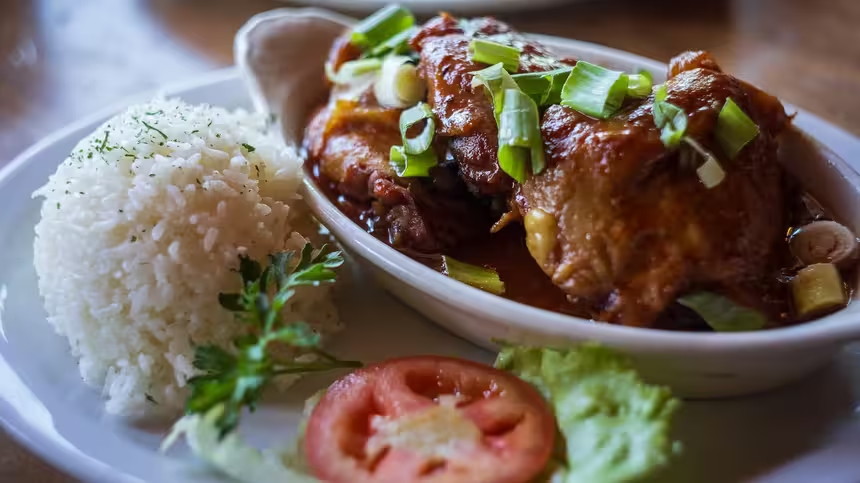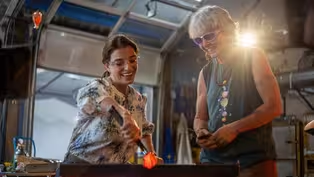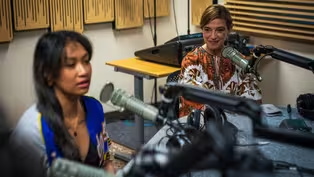
Ron Chambers: Stories from Life in the Yukon
Clip: Episode 2 | 6m 3sVideo has Closed Captions
Pati Jinich learns about life in the Yukon Territory from “Mr. Yukon 2024” Ron Chambers.
Ever wondered what life is like in Canada’s remote Yukon Territory? Pati Jinich gets a glimpse into the life of a man who has lived close to the land and carries its history with him when she shares a meal with Ron Chambers at Mount Logan Lodge. Ron became a cultural ambassador for the Yukon when he was named “Mr. Yukon 2024.”
Problems playing video? | Closed Captioning Feedback
Problems playing video? | Closed Captioning Feedback
Support for PATI JINICH EXPLORES PANAMERICANA is provided by Marriott International, La Costeña, Texas A&M International University, Visit Anchorage, Travel Juneau, Travel Yukon, and Chicanos Por La Causa.

Ron Chambers: Stories from Life in the Yukon
Clip: Episode 2 | 6m 3sVideo has Closed Captions
Ever wondered what life is like in Canada’s remote Yukon Territory? Pati Jinich gets a glimpse into the life of a man who has lived close to the land and carries its history with him when she shares a meal with Ron Chambers at Mount Logan Lodge. Ron became a cultural ambassador for the Yukon when he was named “Mr. Yukon 2024.”
Problems playing video? | Closed Captioning Feedback
How to Watch Pati Jinich Explores Panamericana
Pati Jinich Explores Panamericana is available to stream on pbs.org and the free PBS App, available on iPhone, Apple TV, Android TV, Android smartphones, Amazon Fire TV, Amazon Fire Tablet, Roku, Samsung Smart TV, and Vizio.
Buy Now

The Pati Jinich Recipe Collection
Find Pati Jinich recipes from this series and more on PBS Food.Providing Support for PBS.org
Learn Moreabout PBS online sponsorshipRon Chambers, a Tlingit and Southern Tutchone elder, has spent a lifetime in Yukon's wilderness as a trapper's son, park warden, and search and rescue leader.
Beautiful.
Beautiful.
It's a beautiful meal.
Thank you.
And I am so grateful.
Should I give you all some of these?
Yes, that would be great.
Yeah.
Can I give you?
It's beets, tomatoes... Its very good for old men like us.
Whos us?
What are you talking about here?
Tonight, at Mount Logan Lodge in Haines Junction, he joins me for dinner with Whitehorse chef Miche Genes and her husband, Hector Mackenzie to share some stories that shaped his life.
So, you were telling me about your family and how on your grandparents side, both of your grandmothers came from different First Nation communities?
And you were telling me, which I found fascinating, and it's so important, that First Nations people go beyond the countries that exist today.
Right?
We don't see the boundaries the same as other people do.
Tell me about it.
Well, it's a created boundary, of course, and it's invisible and, well, it's not so invisible because they've cut a line through there now, but culturally, it's invisible.
Because I've got relatives in Alaska, cousins, first cousins and and then like I say my grandmother's from Alaska, one of my grandmothers.
So we still have to deal with in today's context, country-wise but culturally we don't see the border as a people.
We see the border as citizens of whatever side you're on, but not as a people.
So I understand, of course, that you are the same community of people, but you are impacted by different sets of law, by different sets of institutions.
How does that impact the relationship between the communities that are separated by political borders?
There's quite a difference because the politics is different for one.
And in Canada, for example, we're quite sympathetic to a lot of things that the U.S. does.
But but that doesn't make us complacent to it.
For example?
Well, I graduated in high school in Alaska, but I was raised here in the Yukon.
And I went to school.
I lived with my cousins over there, and when I left high school, I didn't know where I was going to go and what I was going to do.
I almost ended up in Vietnam because I was going to join the Army, because I had no idea what I was going to do over here.
They wouldn't take me at the tim because I was a Canadian.
There was a thing that had nothing to do with my First Nation background.
It had to do with where I was living, and what I was educated to.
You think you still see eye to eye with your family members that are a part of the United States as a country.
It's kind of a political thing.
But the, with First Nations there was a little bit of sympat for the Vietnamese people.
But as a citizen of the time and the place, many First Nations that I grew up with, my cousins in Alaska, there's a number of them who have Purple Hearts and a few other things that, that they got by being over ther So they did get themselves physically involved.
But our histories were a little bit closer than a lot of people realize.
Now a national historic site, the S.S. Klondike once navigated the Yukon River from 1929 to 1950, primarily for transportation and trade.
But like other riverboats of its time, it also carried indigenous children like Ron's sisters away from their communities to distant residential schools, where they were forced to abandon their culture and adopt Christian values.
One of the steamboats that my sisters went down.
Well, they went down in a number because they went down, I think 3 or 4 years.
I don't know.
They didn't tell me the history.
They don't talk about it.
But anyway, they went down and back in different boats.
They went down one, come back another steamboat.
One of the steamboats ran into a rock wall at what's called Five Finger Rapids, which is now Four Finger Rapids apparently.
Since one of the rocks had fallen into the river.
And it ran into the rock, and, you know, they almost thought they were going to sink and everything else.
And, I was just down there last, last fall.
A young guy give us a ride and we get pulled up to Five Finger Rapids.
And I saw a cable there, and they used to help the steamboats get through Five Finger Rapids because it was really fast and steep.
But it was the broken cable, and they'd hit the rocks and went down and they just about sunk the boat.
My two sisters were on that boat.
They never said one word about it to me my whole lifetime.
I happened to ask them, I said, “Did you know anything about that boat that hit the rocks down there?” They said, “Yeah, we were on it.
To somebody else, this would be an adventure of a lifetime, but to them, they were leaving their family, and going somewhere, and they're not going to come home till next spring.
So they never brought it up.
My whole lifetime, my sisters never mentioned that this is one of the most exciting things that was happening on the Yukon River, and they were there.
Right.
So history can be hidden if people don't ask the right questions or have the affinity for it.
Beautiful & Unbreakable: Glassblowing in Yukon
Video has Closed Captions
Clip: Ep2 | 5m 42s | Pati Jinich visits Lumel Studios to try glassblowing and learns it’s more than just art. (5m 42s)
Uncovering Alaska's Filipino Soul
Video has Closed Captions
Clip: Ep2 | 7m 10s | Fascinating stories and food from Juneau’s vibrant Filipino community. (7m 10s)
Providing Support for PBS.org
Learn Moreabout PBS online sponsorshipSupport for PBS provided by:





















